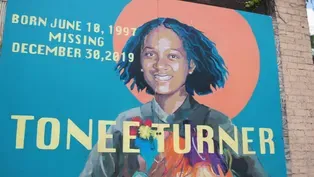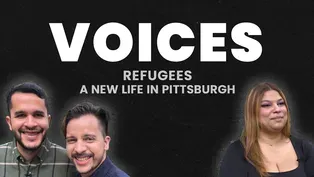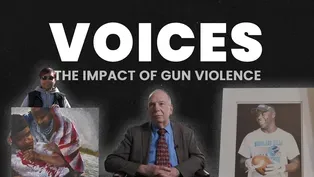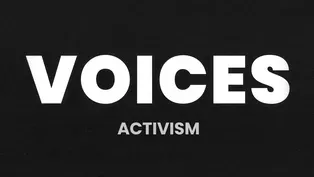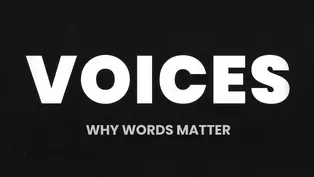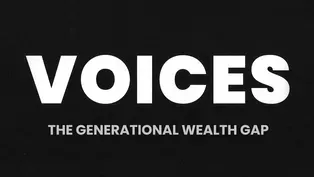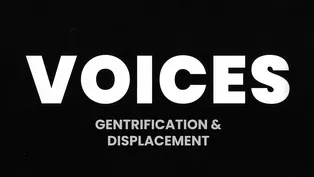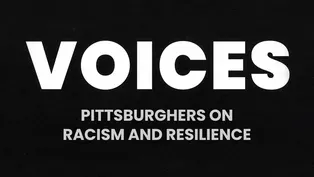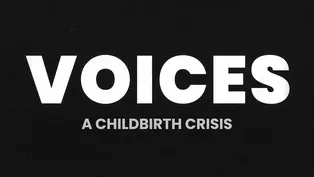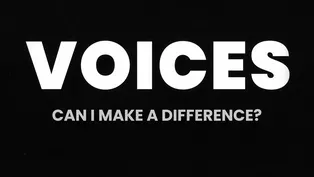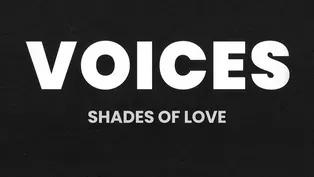WQED Digital Docs
VOICES: The Prison System
4/26/2022 | 11m 8sVideo has Closed Captions
Hear from formerly incarcerated local citizens on their experiences and hopes for change.
Over 2 million Americans are incarcerated in jails, prisons, and juvenile correction institutions. In this episode of VOICES, formerly incarcerated local citizens reflect on their experiences, thoughts, and hopes for changing America’s criminal justice system.
Problems with Closed Captions? Closed Captioning Feedback
Problems with Closed Captions? Closed Captioning Feedback
WQED Digital Docs is a local public television program presented by WQED
WQED Digital Docs
VOICES: The Prison System
4/26/2022 | 11m 8sVideo has Closed Captions
Over 2 million Americans are incarcerated in jails, prisons, and juvenile correction institutions. In this episode of VOICES, formerly incarcerated local citizens reflect on their experiences, thoughts, and hopes for changing America’s criminal justice system.
Problems with Closed Captions? Closed Captioning Feedback
How to Watch WQED Digital Docs
WQED Digital Docs is available to stream on pbs.org and the free PBS App, available on iPhone, Apple TV, Android TV, Android smartphones, Amazon Fire TV, Amazon Fire Tablet, Roku, Samsung Smart TV, and Vizio.
Providing Support for PBS.org
Learn Moreabout PBS online sponsorshipMore from This Collection
Video has Closed Captions
When a person of color goes missing, are they given the same consideration as other races? (11m 24s)
VOICES: Refugees: A New Life in Pittsburgh
Video has Closed Captions
Every year, hundreds of refugees arrive in Western Pennsylvania, hoping to start new. (7m 18s)
VOICES: The Impace of Gun Violence
Video has Closed Captions
While no two stories are the same, the impact of gun violence affects nearly everyone. (9m 38s)
Video has Closed Captions
Meet people who were moved by societal concerns to take action for the first time. (10m 48s)
Video has Closed Captions
This episode explores how derogatory terms enter the lexicon, and why words matter. (5m 52s)
VOICES: The Generational Wealth Gap
Video has Closed Captions
An absence of generational wealth among minority families often leads to obstacles. (7m 32s)
VOICES: Gentrification & Displacement
Video has Closed Captions
We look at gentrification and its impact on Pittsburgh's marginalized communities. (9m 59s)
VOICES: Pittsburghers on Racism and Resilience
Video has Closed Captions
Pittsburghers of different backgrounds share their encounters with discrimination. (10m 45s)
Video has Closed Captions
Decades of inequity in the healthcare system have led to a crisis in Black maternal health (10m 9s)
VOICES: Can I Make a Difference?
Video has Closed Captions
Pittsburgh area youth talk about today’s social climate, racism, inequity, and more. (6m 31s)
Video has Closed Captions
Two couples of reflect on their personal experiences with interracial relationships. (10m 26s)
Providing Support for PBS.org
Learn Moreabout PBS online sponsorship(deep serious music) - The prison system is a self-perpetuating system.
People are locked up, that makes their circumstances worse.
- There comes a point where the punishment becomes too much, and it not only affects the women, it affects their children.
- I believe that there is zero rehabilitation in the prison system.
They're expecting you back.
- There's so many folks who don't have a voice to be able to communicate what's happening to them or what's happening within this system.
There's a lot of languages that they use to describe us.
Ex-offenders, returning citizens, formerly incarcerated.
- Unfortunately, I've had to the honor of being in three different county prisons.
I remember when hearin' that door slam for the first time, I was ashamed.
I was so embarrassed that my mother's son was in jail.
- I started my prison sentence in high security, and I stayed there for 4 1/2 years.
I worked my way down, good behavior, doing what I was supposed to do.
- 25-50 years sentence for delivering 9/10 of one gram of heroin.
I did 25 years inside.
Now I have to do 25 years on parole outside, and I've been home 10 or 11 years now.
(soft solemn music) - There's a lot of mind games that you play with yourself when you're inside these institutions that help maintain your sanity.
- Some of the treatment in prison is really less than humane.
Talked to any kind of way, screamed at, cussed at.
If you did the same things, you would get wrote up or threw in the hole.
- It usually has to do with staff and security, and if they are people of conscience, then you might get treated fairly.
- I remember my first night in Bucks County, and it took me about three days to get this, a toothbrush, deodorant, soap, a wash rag, because none of 'em cared.
- I was at a prison when one of the captains sexually assaulted some women, and the system never got them any kind of help.
- Fights happen in prison all the time.
There's a different set of rules, and if you're not used to it, you better get used to it as soon as the door closes.
- It's a very sad and traumatic place to be.
I never want to go back.
(chuckles) (low solemn music) You run the whole thing.
We do the yard work, we do the preparing of the food, everything else.
- The highest paying job I had in New Jersey was 19 cent an hour.
(laughs) And you work hard.
There was so many things that I provided to the state of New Jersey that was profitable to that state.
- Clothing contracts, food contracts, bed contracts.
You think of everything it takes to run a prison.
There's somebody making a lot of money.
- When you really look under the hood and kind of pull back the layers of this, you really see it's about money, it's about an economy, it's about labor.
- I remember Johnny Cochran saying the color of justice in America is green.
So if you have money, your chances of getting justice are far better than those people who don't have money.
- The sentence disparity in the United States is ridiculous.
I cannot tell you how many women I've met that were serving life sentences for drug convictions.
- In the community that I come from, and I'm talking about the African-American community, it's no longer a stigma for somebody to have been in prison.
(soft pensive music) - If you really look at the 13th Amendment, we technically didn't free the slaves.
We said you can free the slaves unless you catch 'em committing a crime.
- There have been a lot of changes, a lot of so-called progress, and there has been some progress.
Nevertheless, I think at the root of this system, that attitude of racism still exists today.
(soft gentle music) I remember when I went into prison, they had Pell Grants.
I had one.
I started to go to college in order to earn a degree, and then the Pell Grants were stopped.
Not thinking about fact that people who got degrees were less likely to commit crimes and come back to prison again.
- I made mistakes, and I paid for my mistakes.
However, you come back out into this world, and people don't wanna give you another chance.
It's like you continue to pay for this sentence.
- I went from being homeless to incarcerated to homeless.
After being released, you're not staked with a big amount of money.
So when you're released, you have to find your own place to stay, how you're gonna get there, clothes to wear, how you're gonna pay your bills.
- A lot of times, people wanna do background checks on you, and once they see that you have something on your background, they don't wanna give you an opportunity to rent from them or to work from them.
- If you don't have the support of family or loved ones coming out of prison, it's very difficult.
- I was denied coming home, back to my house in Pittsburgh.
They released me in Patterson, New Jersey.
I had to line up at a homeless shelter.
When I made my way to my parole officer's, all these things that I thought was available, which could have helped me, he said that that fund is depleted or that account is depleted, and here was a check for $24.
None of this is actually setting me up to succeed, to not going back.
(soft hopeful music) - There are a lot of people in prison who really want to change.
People have to be brought into the system who care.
- The separation of mother and child.
I cannot tell you how hard it is, or almost impossible, to keep a relationship or a bond when you get 15-minute phone calls.
You had the means to send us away, why can't you have the means so that the children and the women can be in a nurturing, healthy environment because, in the long range, that child doesn't end up in the system.
- Every institution that I've been in, I've always been assigned a job from the day that I enter those institutions.
Use it for the betterment of society when I leave this place.
So that you're saying, "We ended up training this individual as a skilled, certified welder, as a certified carpenter."
- If the community got involved, if people were willing to hire someone right out of jail, it may not be successful every time, but the successes will be there.
- This whole system is difficult.
I don't believe there's any one single answer, "This is how you do it," except to treat people like you want to be treated.
I know that's simplistic, but I believe that that is at the root of turning this system around.
- When we're coming into the system, it's because we're broken, and we've been broken in life for a long time.
And, unfortunately, when we're standing in front of a judge, he's not looking at what brought us to this point.
- Because of my alcohol and drug addiction for so long, I got involved with a 12-step fellowship.
So I got a sponsor, I got a mentor, a spiritual advisor, and all of that.
I began to see things in a different light.
- Every morning, I wake up, and I text 15 to 20 people.
"Good morning" with a little positive inspiration, "Have a great day."
And I get responses all the time.
And that connection, having those people in my life, one, it keeps me clean and sober.
Two, it lets me know that they're reciprocating the love that I'm giving them.
And three, it keeps me outta jail.
It keeps me in a positive mindset.
- And it does get better.
I'm living proof that it gets better, but you have to work at it.
So trauma-based groups are probably a very, very big need.
I also believe in peer support systems.
I believe that the person that's gonna help me the most is the one that's living like I wanna live, but lived like I used to live.
- I happen to come across people that continue to give me an opportunity off of their interaction with me, and it gave me the ability to still be successful in life.
For me to say I'm a director at a nonprofit, at Operation Better Block, that's a blessing.
- Don't walk out of prison, or jail or wherever it may be, and be that person for the rest of your life.
Don't let it define you.
You can change.
- The things that people watch on TV and the stigmas attached to criminals or formerly-incarcerated people or drug addicts, they're wrong.
They're so, so wrong.
Don't just categorize everybody in one lump sum because we are far from that, and some of the best people you'll ever meet, the most talented individuals you'll ever meet, are formerly-incarcerated individuals.
(soft poignant music)
WQED Digital Docs is a local public television program presented by WQED
